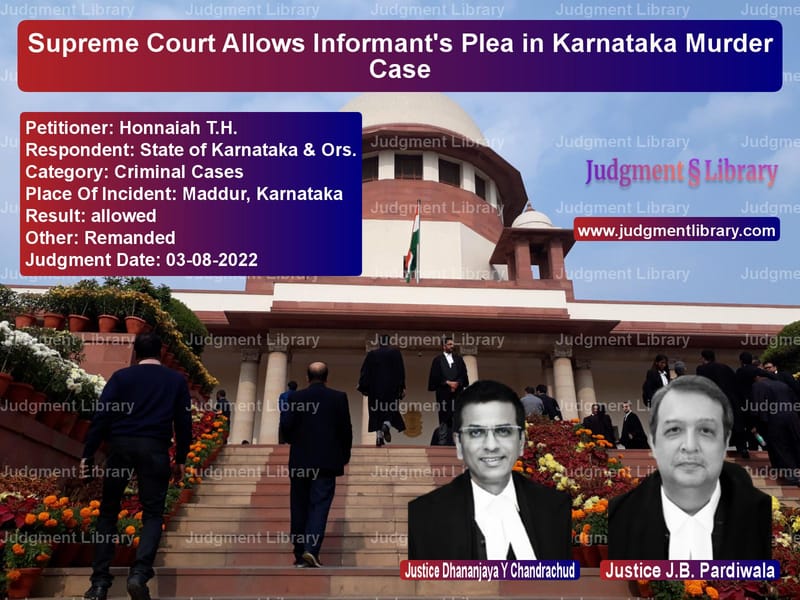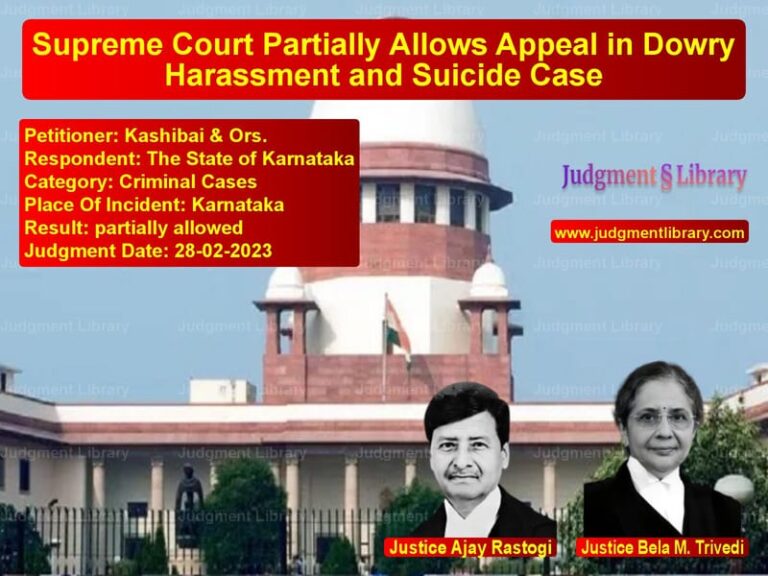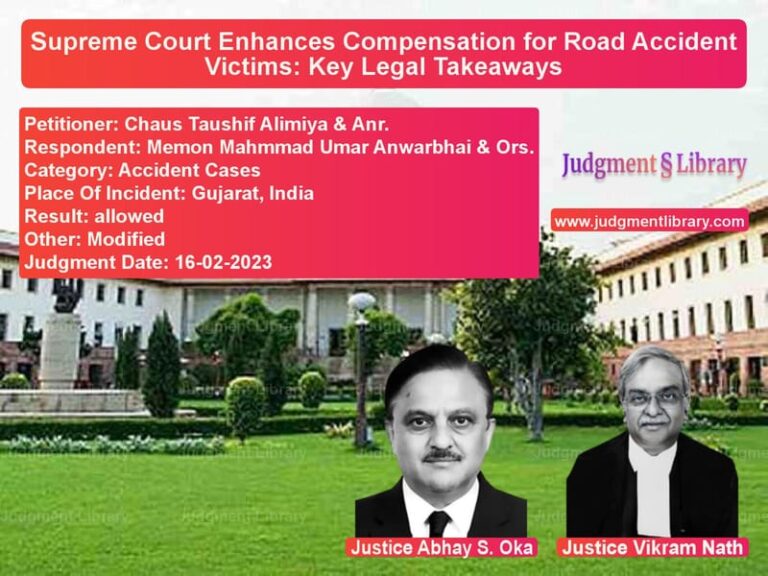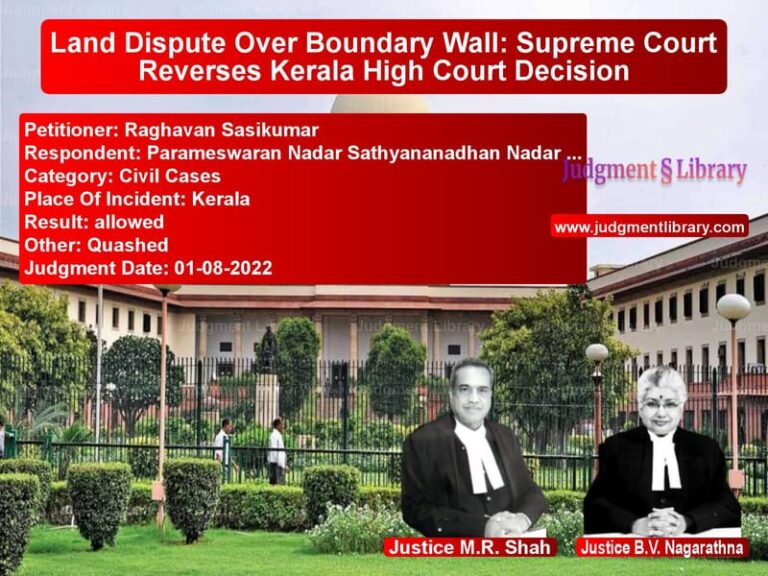Supreme Court Allows Informant’s Plea in Karnataka Murder Case
The case of Honnaiah T.H. vs. State of Karnataka & Ors. concerns a significant ruling on the rights of an informant in criminal cases. The Supreme Court set aside the Karnataka High Court’s decision, holding that the informant had the right to challenge an interlocutory order during a criminal trial.
Background of the Case
The case originated from a violent dispute over water allocation in Thoppanahalli village, Maddur, Karnataka, on December 25, 2016. The altercation resulted in the deaths of two individuals and injuries to several others, including the appellant, Honnaiah T.H.
An FIR (Crime No. 0582 of 2016) was registered at Maddur Police Station under multiple sections of the Indian Penal Code (IPC), including Sections 143, 147, 148, 504, 323, 302, 307, 114, and 149. The appellant claimed that he was the original informant in the case and had provided the first report of the incident.
Legal Issues Before the Court
- Whether the trial court erred in refusing to mark the appellant’s statement as an exhibit.
- Whether the High Court was justified in dismissing the appellant’s revision petition on the ground of maintainability.
- Whether an informant has the right to challenge interlocutory orders in a criminal trial.
Arguments Presented
Petitioner’s (Appellant’s) Arguments
- The appellant argued that his statement formed the basis of the FIR and should be treated as a crucial piece of evidence in the trial.
- He contended that the trial court’s refusal to mark his statement as an exhibit severely affected the prosecution’s case.
- He challenged the High Court’s view that an informant had no locus standi to file a revision petition.
Respondents’ (State of Karnataka’s) Arguments
- The prosecution supported the appellant’s plea, arguing that his statement was essential for a fair trial.
- The defense contended that the appellant’s statement should be treated as a statement under Section 161 CrPC and not as an FIR.
- The defense also maintained that the High Court was correct in ruling that an informant could not file a revision petition.
Supreme Court’s Observations
On the Importance of the Appellant’s Statement
The Supreme Court, comprising Justice Dhananjaya Y Chandrachud and Justice J.B. Pardiwala, emphasized that the appellant’s statement formed the basis of the FIR.
“There would be a serious miscarriage of justice in the course of the criminal trial if the statement were not to be marked as an exhibit since that forms the basis of the registration of the FIR.”
On the Maintainability of the Revision Petition
The Court rejected the High Court’s ruling that the appellant had no right to file a revision petition.
“The revisional jurisdiction under Section 397 CrPC can be exercised where the interest of public justice requires interference for correction of manifest illegality or the prevention of gross miscarriage of justice.”
On the Nature of Interlocutory Orders
The Supreme Court clarified that not all orders passed during a trial are purely interlocutory in nature.
“An order which substantially affects the rights of the parties cannot be said to be interlocutory so as to bar a revision under Section 397(2) CrPC.”
Judgment and Its Implications
The Supreme Court allowed the appeal and set aside the High Court’s order. The key directives of the judgment were:
- The appellant’s statement was to be marked as an exhibit during the trial.
- The High Court’s ruling that the revision petition was not maintainable was overturned.
- The trial court was directed to conclude the case by March 31, 2023.
Significance of the Judgment
- Protects Informant Rights: The ruling affirms the role of an informant in criminal proceedings and allows them to challenge procedural errors.
- Prevents Procedural Injustice: The decision ensures that crucial evidence is not excluded due to technical errors.
- Clarifies Revision Jurisdiction: The judgment provides guidance on when a revision petition is maintainable under Section 397 CrPC.
Conclusion
The Supreme Court’s ruling in Honnaiah T.H. vs. State of Karnataka is a landmark decision that upholds the rights of informants and clarifies the scope of revision jurisdiction in criminal trials. By allowing the appellant’s statement to be marked as an exhibit, the judgment strengthens the integrity of criminal investigations and prosecutions.
Petitioner Name: Honnaiah T.H..Respondent Name: State of Karnataka & Ors..Judgment By: Justice Dhananjaya Y Chandrachud, Justice J.B. Pardiwala.Place Of Incident: Maddur, Karnataka.Judgment Date: 03-08-2022.
Don’t miss out on the full details! Download the complete judgment in PDF format below and gain valuable insights instantly!
Download Judgment: honnaiah-t.h.-vs-state-of-karnataka-&-supreme-court-of-india-judgment-dated-03-08-2022.pdf
Directly Download Judgment: Directly download this Judgment
See all petitions in Murder Cases
See all petitions in Attempt to Murder Cases
See all petitions in Judgment by Dhananjaya Y Chandrachud
See all petitions in Judgment by J.B. Pardiwala
See all petitions in allowed
See all petitions in Remanded
See all petitions in supreme court of India judgments August 2022
See all petitions in 2022 judgments
See all posts in Criminal Cases Category
See all allowed petitions in Criminal Cases Category
See all Dismissed petitions in Criminal Cases Category
See all partially allowed petitions in Criminal Cases Category







